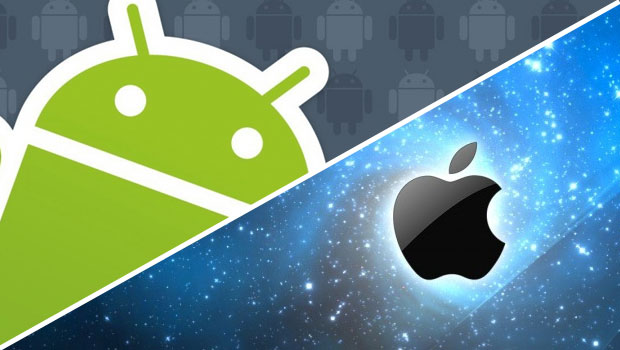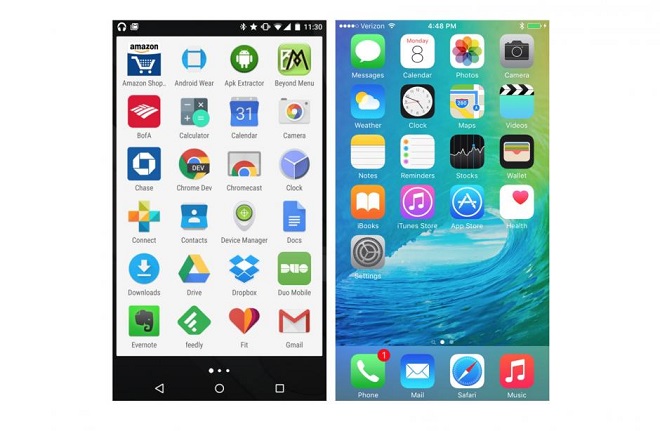Rivalries exist in all phases of life. Whether it is education or sport, be it technology or business, rivalries are what fuel opponents into making the most out of their resources in an attempt to claim the bragging rights over each other. The smartphone world is no such exception and one of the biggest debates that exist in the techno-sphere is whether the iPhone’s operating system, the iOS, is better than Android or vice versa.

This debate certainly mirrors that to other great rivalries we witness in the modern world most notably Barcelona vs Real Madrid, Lionel Messi vs Cristiano Ronaldo, Steph Curry vs LeBron James etc. which is why we here at PriceOye have decided to further pour fuel over this debate by looking at it from an average Pakistani’s perspective. Here’s our take on whether iOS or Android is the more suited operating system for an average Pakistani user.
User-friendliness
The first and foremost attribute that we’d like to highlight when it comes to what users, in general, look for in an operating system is how user-friendly it is. User-friendliness refers to how easy it is to get acquainted with something and how facile do you find in working in tandem with it. Android has developed its reputation as one of the most easy to use mobile operating systems despite being loaded with different features.

Whether it’s deleting a message or simply downloading something from the internet, Android allows you easy pickings which is not seen on the iOS. iOS generally takes 1-2 extra steps in doing what can be done through a single tap in Android, let alone completely not allowing some possibilities in Android such as directly downloading music or videos through the Internet on your Apple devices.
Another extremely valid argument when it comes to the Android vs iOS battle is that how easy it is to transfer data between your device and a computer. While Android simply allows plug and play i.e. connecting your smartphone to your computer via USB and accessing its internal data, iOS requires the iTunes software to make any such transactions.
This has proven to be frustrating at times as it requires you to learn running iTunes (though it isn’t that difficult) but considering an average Pakistani user and the adult Pakistani community (especially my parents), they would prefer going for Android rather than getting themselves into any such mess.
Winner: Android, for most people.
Features
After user friendliness, we’ll assess what features Android and iOS offer it users. One of the biggest out-roars that Apple faces is the lack of Bluetooth connectivity in its devices. While the Bluetooth feature is present in all of its devices, it almost never works whether you’re connecting an Apple device with an Apple device or you’re connecting an Apple device with some other thing. It simply never works!
Apple fanboys argue that Bluetooth isn’t that major a requirement nowadays as there are other alternatives to it which include cloud storage, Email, WhatsApp etc. and their argument is valid. But when you look at it from an average user’s perspective, they’d simply prefer staying away from the extra work required to manage cloud storage etc. and simply connect their smartphones via Bluetooth and let them do the talking.
When it comes to sending data through WhatsApp, you require WiFi or mobile internet to transfer any sort of data (though it does not support some data formats such as .GIF etc.) which is not the case when it comes to Bluetooth. Hence to put it into simple words, Bluetooth might not be the ultimate necessity as it was a decade ago but it still is nevertheless a necessity for an average user.
Previously, Android and iOS had a gulf of class between what features they used to offer. iOS has somewhat cut that gap down and on the other hand also introduced the revolutionary 3D-Touch on its latest iPhone 6S and 6S Plus. It is a plain fact that iOS is the more optimized of the two software which is symbolized by the fact that how easily iPhones outperform many other powerful Android devices such as the Samsung Galaxy S6 with much less RAM and lighter cores.
These software/hardware optimizations make the iOS faster and lighter compared to Android which is deemed resource exhausting. Android though offers widgets, a wider range of apps, ability to directly download stuff on your device among other features which makes it heavier than iOS. Android also has a larger pool of customers/developers that help in its constant improvement. iOS on the other hand is exclusive to Apple which makes it all the more commendable as to how far it is has come with just one major stakeholder.
Winner: Android, but not by a big margin.
Jailbreaking iOS for more features
People will argue that iOS can be jailbreaked to open it to new horizons though we believe that an average user wouldn’t be able to do that on his own. Jailbreak although opens up a Pandora Box of features for any Apple device, it does make the device extremely unstable causing it to repeatedly crash and flicker. This destroys the subtle Apple experience to shreds so we’d personally recommend not doing it or letting an experienced Apple user do it for you.
The verdict states that while iOS may be the more subtle and optimized of the two software, Android is more suited to the needs of an average Pakistani user due to its greater user friendliness and more set of features. Devices such as Nexus 5X, LG G5 etc. make light work of Android and provide users with excellent user experience that is 100% lag free. If its Android’s performance what is most important to you, the Nexus phones are the ones to go to. Otherwise, Samsung, LG, Oppo, Huawei etc. are doing a stellar job when it comes to producing high-quality Android phones.
If you’re on the lookout for more different types of Android smartphones, do check out the fastest smartphones in Pakistan‘s Android listings. Do you agree or disagree with what we have to say? Let us know in the comments below.
Images courtesy via Google.


Leave a Comment